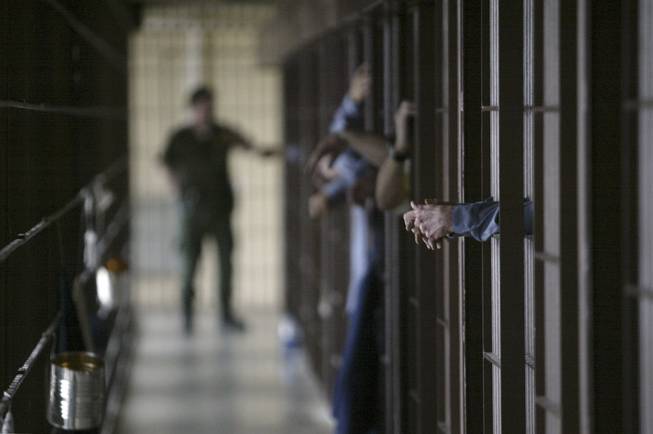
Cathleen Allison / AP
A corrections officer talks with inmates in the cellhouse at the Nevada State Prison in Carson City.
Tuesday, May 12, 2015 | 2 a.m.
A bevy of tough-on-crime bills brought before the Legislature this year threatens to significantly raise inmate numbers at Nevada’s already overcrowded jails and prisons, local civil rights advocates said in a report released Monday.
The 18-page report, prepared by the American Civil Liberties Union of Nevada, lists more than 60 initiatives that “criminalize Nevadans,” lobbyist Vanessa Spinazola said. The bills in question include proposals to create or extend punishments for actions ranging from carrying certain drugs to making a U-turn in a school zone.
“We’re always troubled by how many bills create more prison time for people, especially considering how much our jail is costing us over time,” Clark County Public Defender Phil Kohn said. “It just seems that we’re sending people off to prison and jail, and it doesn’t solve our taxpayers’ problems.”
ACLU officials say the measures come at a time when conservative and liberal lawmakers across the country are seeking alternatives to relieve mass incarceration.
But backers of the initiatives argue that they’re only trying to protect victims and discourage more crime.
“Harsher punishment can be a deterrent,” said Sen. Mark Manendo, who helped author two bills listed in the ACLU report — one toughens punishment for drivers involved in hit-and-run crashes, and another expands penalties for traffic violations in pedestrian-heavy zones.
Here’s a look at five of the report’s most noteworthy bills, as picked by Spinazola:
Assembly Bill 297, drug trafficking expansions:
Backed by the Assembly’s Committee on Judiciary, this bill aims to add certain controlled substances to the drug categories that are subject to trafficking laws. Generally, the types of drugs that would be included under the bill are those with moderate to low risk of physical dependence, such as ketamine and certain steroids. AB 297 also lowers the amount of drugs that a person must possess to be found guilty of trafficking. It cleared the committee’s approval on April 7.
Senate Bill 245, tougher penalties for hit-and-run drivers:
The Senate’s Committee on Transportation introduced SB 245 to toughen penalties for drivers who flee the scene of a wreck. The initiative would increase the maximum term of imprisonment for offenders from 15 to 20 years. Under the proposed law, people charged with fleeing the scene of a wreck wouldn’t be eligible for probation. The Senate passed SB 245 on April 21.
Assembly Bill 244, graffiti enhancement:
Authored by Republican Assemblymen Lynn Stewart and John Ellison, AB 244 makes a graffiti offense a Category C felony if it is committed three or more times, regardless of the value of the defaced property. Category C felonies are punishable by up to five years in state prison. This bill cleared the Assembly on April 21.
Assembly Bill 49, lewdness expansions:
AB 49 makes it a Category D felony for someone to distribute so-called “intimate images” and for asking for money to have the image removed from public view. A felony in that category is punishable by up to four years in state prison. The bill also expands the criminal definition of lewdness with a minor and increases penalties for related crimes. It cleared the Assembly on April 21.
Assembly Bill 193, hearsay evidence authorization:
Another bill backed by the Assembly’s judiciary committee authorizes the use of certain hearsay evidence in preliminary examinations in court. (Hearsay is usually not allowed to be used as evidence in court.) The ACLU argues that this infringes on defendants’ rights. The Assembly passed AB 193 on April 21.
Read the full report below.

Join the Discussion:
Check this out for a full explanation of our conversion to the LiveFyre commenting system and instructions on how to sign up for an account.
Full comments policy